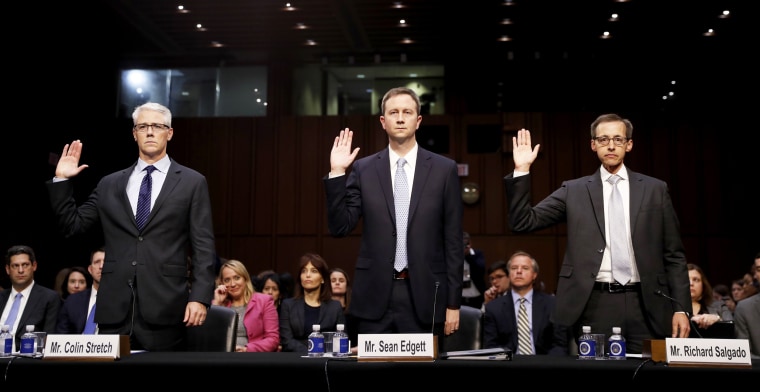Facebook, Twitter and Google were slammed by lawmakers Tuesday for failing to prevent the Russians from placing propaganda on their sites following revelations that millions of Americans were exposed to it during the presidential election.
"There's a lot I think you could have done earlier," said Sen. Patrick Leahy, D-Vt., who called the tech giants "Johnny Come Latelys" at a Senate Judiciary subcommittee on crime and terrorism hearing. "You guys have a great responsibility."
Sen. Al Franken, D-Minn., said he could not understand how Facebook in particular got duped by the Russians.
"How did Facebook…somehow not make the connection that electoral ads paid for in rubles were coming from Russia?" he asked Facebook's general counsel Colin Stretch. "How could you not connect those two dots."
"There were signals we missed," Stretch replied.
"People are buying ads on your platforms with rubles," Franken said. "You can’t put together rubles with a political ad and go, 'Hmmm'?"
"It's a signal we should have been alert to," Stretch said.
Before the sometimes contentious questioning got under way, Sen. Lindsey Graham, R-S.C., warned that "these technologies can be used to undermine our democracy and threaten our country."
Stretch agreed.
"The foreign interference we saw was reprehensible," said Stretch, who quickly added that the ads posted by "bad actors" on Facebook were a tiny portion of the content that appeared on the site. "But any amount was too much."
In response to a question from Graham, Stretch said Russian-backed actors began infiltrating Facebook in 2015 and remained there until their accounts were disabled several months ago.
He said that before the election last year the Russian accounts were trying to undermine Hillary Clinton's campaign. After the election, the Russian-backed entities tried to sow more dissension by questioning the validity of President Donald Trump’s victory.
Sen. Chris Coons, D-Del., unveiled a Facebook ad that appeared on the site during the campaign and which he said "was paid for by Russians in rubles" by a group calling itself Heart of Texas which falsely claimed Clinton was despised by most veterans.
"That advertisement has no place on Facebook," Stretch said. "It makes me angry. It makes everybody who works at the company angry."
Twitter's acting general counsel Sean Edgett said they were aware of Russian attempts to use the platform to affect the election and took immediate steps to stop it.
"We have banned all those users as advertisers," he said. "Twitter believes that any activity of that kind, regardless of the magnitude, is unacceptable."
Google attorney Richard Salgado said the company had been taking steps to "secure the platform" from Russians and other interlopers long before the 2016 election.
"We are committed to doing our part," he told lawmakers in his opening statement.
When the questioning got underway, however, Graham asked which nations "other than Russia" were trying to infiltrate the platforms.
The company representatives offered no immediate answer.
One senator did not appear to understand that Google is a platform as opposed to a news organization.
"Aren’t you the biggest newspaper in 92 countries?" Sen. John Kennedy, R-La., asked.
"We’re not a newspaper," Salgado said.
Meanwhile, Sen. Ted Cruz, R-Texas, asked the Facebook and Twitter reps whether they considered their sites "to be neutral public forums."
"We think of Facebook as a platform for all ideas," said Stretch.
Some 126 million Americans, roughly one-third of the nation's population, received Russian-backed content on Facebook during the 2016 campaign, according to Facebook.
About 29 million Americans directly received material from 80,000 posts by 120 fake Russian-backed pages in their own news feeds.
But Stretch played down the significance of that level of exposure to content from Russian-backed accounts.
"Our best estimate is that approximately 126 million people may have been served one of their stories at some point during the two-year period," Stretch said. "This equals about four-thousandths of one percent (0.004%) of content in News Feed, or approximately 1 out of 23,000 pieces of content."
Two sources told NBC News Monday that Twitter found 36,746 automated accounts — or bots — that were linked to Russia between September 1, 2016 and November 15, 2016. The accounts tweeted 1.4 million times and were seen 288 million times.
Edgett said that these "Russian-linked, automated accounts constituted less than three quarters of a percent (0.74%) of the overall election-related tweets on Twitter at the time."
The company also found 2,752 Twitter accounts associated with the Russia-run Internet Research Agency, up from the 201 the company originally disclosed. The company has suspended all 2,752 accounts and is "proactively giving committee investigators the handles of these accounts."

